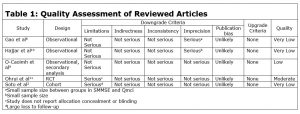Angiotensin-Converting Enzyme Inhibitors Can Slow the Progression of Cognitive Decline In Elderly Patients With Dementia
Abstract
Background: Dementia is a slow progressing neurodegenerative disease characterized by loss of executive functioning, communication ability, and activities of daily living. With few treatment options currently approved for dementia, angiotensin-converting enzyme inhibitors (ACE-I) have been implicated as a new potential treatment to slow cognitive decline. ACE-I use in dementia, however, is controversial due to conflicting research and new discoveries regarding the pathophysiology of the brain and ACE. This systematic review aims to evaluate the current research on ACE-I use in cognitive decline.
Methods: Exhaustive search of available medical literature databases including MEDLINE (via Ovid and PubMed), Google Scholar, Clinical Key, and Web of Science was conducted. Keywords used in the search included: Alzheimer disease, dementia, ACE inhibitors, angiotensin converting enzyme inhibitors, cognitive decline, renin-angiotensin system, and RAS. Alzheimer disease (AD) and vascular dementia (VaD) was the focus of this review based on the proposed pathophysiology. Studies were included if cognitive assessment tools such as the mini mental status exam, mini-cog or Qmci, were assessed at baseline and an end-point with a minimum of 6 months. Articles were assessed for quality using the GRADE criteria.
Results: Five studies met inclusion criteria and were evaluated. Three of the studies found were retrospective, one study was a randomized controlled trial, and one was a prospective cohort study. Apart from one very low quality study, the results were consistent that ACE-I may slow the progression of cognitive decline in dementia patients.
Conclusion: Current research on dementia progression and ACE inhibitors, as measured by cognitive assessment tools, have been shown to slow cognitive decline in elderly patients. Further research, preferably multiple, large randomized controlled human trials are necessary to determine the risk versus benefit of ACE inhibitor use.
Keywords: Alzheimer disease, dementia, angiotensin converting enzyme inhibitors, cognitive decline, and renin-angiotensin system.
(Click on image to enlarge.)
REVIEWED STUDIES:
Soto ME, Abellan vK, Nourhashemi F, et al. Angiotensin-Converting Enzyme Inhibitors and Alzheimer’s Disease Progression in Older Adults: Results from the Réseau sur la Maladie d’Alzheimer Français Cohort. J Am Geriatr Soc. 2013;61:1482-1488 7p.
Gao Y, O’Caoimh R, Healy L, et al. Effects of centrally acting ACE inhibitors on the rate of cognitive decline in dementia. BMJ Open. 2013;3:10.1136/bmjopen-2013-002881. Print 2013.
O’Caoimh R, Healy L, Gao Y, et al. Effects of centrally acting angiotensin converting enzyme inhibitors on functional decline in patients with Alzheimer’s disease.J Alzheimers Dis. 2014;40:595-603.
Hajjar IM, Keown M, Lewis P, Almor A. Angiotensin converting enzyme inhibitors and cognitive and functional decline in patients with Alzheimer’s disease: an observational study. Am J Alzheimers Dis Other Demen. 2008;23:77-83.
Ohrui T, Tomita N, Sato-Nakagawa T, et al. Effects of brain-penetrating ACE inhibitors on Alzheimer disease progression. Neurology. 2004;63:1324-1325.
AUTHOR: Karielle Brugman graduated from Pacific University, School of PA Studies in August 2017.


